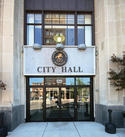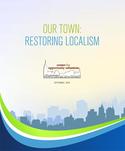In an election cycle full of spittle and bile, arguably the greatest issue --- the nature of governance and the role of citizens --- has been all but ignored. Neither candidate for president has much feel for the old American notion of dispersed power. Instead each has his or her own plans for ever greater centralization: Trump by the force of his enormous narcissistic self-regard; Hillary Clintonthrough the expansion of the powers increasingly invested in the federal regulatory apparatus. read more »
Local Govt. Control: The Ignored Campaign Issue
- Login to post comments
Are-You-Better-Off: 2016 Update
The 2016 US Presidential campaign has gotten so crazy that the term “silly season” just doesn’t do it justice. In a September 2012 article on ng, I asked the question “Are you better off today than you were four years ago?” Eight years ago, the answer in the swing states was clearly “no” as I described it then: read more »
- Login to post comments
California's Boom Is Poised To Go Bust -- And Liberals' Dream Of Scandinavia On The Pacific
As its economy started to recover in 2010, progressives began to hail California as a kind of Scandinavia on the Pacific — a place where liberal programs also produce prosperity. read more »
Cities Need Connectivity in the Global Economy
My latest column is now online in the September issue of Governing magazine. It’s about the criticality of connectivity to success in the global economy. read more »
- Login to post comments
Our Town: Restoring Localism
This is an introduction to a new report from the Center for Opportunity Urbanism, "Our Town: Restoring Localism." Download the full report here.
America is facing a critical moment in its evolution, one that threatens both its future prosperity and the integrity of its institutions. Over the past several decades, government has become increasingly centralized, with power shifting from local communities to the federal level. This has been accompanied by a decline in non-governmental institutions, a matter of concern to thinkers on both the right and the left. read more »
- Login to post comments
The Evolving American Central Business District
After decades of serious economic decline, the inner cores in many of America’s largest metropolitan areas have experienced much improvement in recent years. This is indicated by the “City Sector Model,” (Image 9) which we developed to analyze the largest cities (metropolitan areas) using small functional areas, ZIP Code calculation areas (ZCTAs). read more »
- Login to post comments
What the Blues Brothers and Ferris Bueller’s Day Off Tell Us About Gentrification
The Blues Brothers and Ferris Bueller’s Day Off are two of the seminal films set in Chicago. Indeed, Chicago itself is a character in both films.
The films are radically different even though released only six years apart. There are many ways to slice this. Some have said that one is the South Side movie (The Blues Brothers) and the other the North Side movie (Ferris Bueller). Some see one as more urban, one more suburban. read more »
- Login to post comments
Is it Time for MagLev?
Maryland officials have announced that a proposal to build a maglev line from Washington to Baltimore has received a commitment for the feasibility study of $2 million from Japanese government. read more »
- Login to post comments
The States Gaining And Losing The Most Migrants -- And Money
When comparing the health of state economies, we usually look at employment and incomes. Another critical indicator worth closer attention is where Americans choose to move, and the places they are leaving.
American history has been shaped by migration, from England to the Eastern seaboard, and later from the Atlantic Coast toward the Midwest, and later to the Pacific. read more »
- Login to post comments
The Bridge from Laissez-Faire to Socialism
Cronyism remains unchecked in the world’s largest economy.
We might object to the phrase crony capitalism for two reasons:
First, because cronyism is in some ways the antithesis of capitalism. The freedom to compete and the freedom to fail that are central tenets of capitalism are severely compromised by cronyism when in the former case powerful politicians intervene to shield their friends in business and finance from competition, and in the latter intervene again to save them from bankruptcy or occasionally from criminal prosecution. Of course, these friends in turn are no disloyal slouches and they later show themselves to be supremely appreciative by underwriting, financially and otherwise, those same politicians who had all but guaranteed their continued dominance in normal times and their survival against bad odds in times of distress. read more »






















